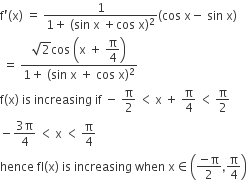 Multiple Choice Questions
Multiple Choice QuestionsGiven P(x) = x4+ ax3 + cx + d such that x = 0 is the only real root of P′ (x) = 0. If P(–1) < P(1),then in the interval [–1, 1].
P(–1) is the minimum and P(1) is the maximum of P
P(–1) is not minimum but P(1) is the maximum of P
P(–1) is the minimum but P(1) is not the maximum of P
P(–1) is the minimum but P(1) is not the maximum of P
Suppose the cube x3– px + q has three distinct real roots where p > 0 and q > 0. Then which one of the following holds?
The cubic has minima at  and maxima at –
and maxima at –
The cubic has minima at – and maxima at
and maxima at
The cubic has minima at both  and-
and- 
The cubic has minima at both  and-
and- 
The differential equation of the family of circles with fixed radius 5 units and centre on the line y = 2 is
(x – 2)y′2 = 25 – (y – 2)2
(y – 2)y′2 = 25 – (y – 2)2
(y – 2)2y′2= 25 – (y – 2)2
(y – 2)2y′2= 25 – (y – 2)2
The function f(x) = tan-1 (sinx + cosx) is an increasing function in
(π/4, π /2)
(–π/2, π /4)
(0, π /2)
(0, π /2)
A.
(π/4, π /2)

The normal to the curve x = a(1 + cosθ), y = asinθ at ‘θ’ always passes through the fixed point
(a, 0)
(0, a)No
(0,0)
(0,0)
If the line ax + by + c = 0, ab 0, is a tangent to the curve xy = 1- 2x, then
a> 0, b < 0
a>0, b> 0
a< 0, b > 0
a< 0, b < 0
Time period T of a simple pendulum of length l is given by T = . If the length is increased by 2%, then an approximate change in the time period is
2 %
1 %
%
None of these
The number of values of k, for which the equation x2 - 3x + k=0 has two distinct roots lying in the interval (0, 1), are
three
two
infinitely many
no value of k satisfies the requirement
